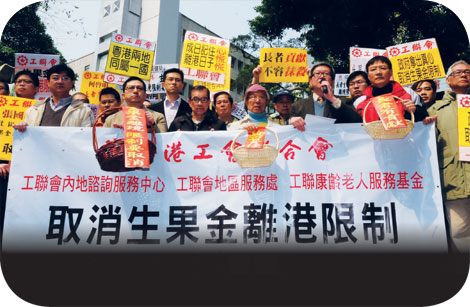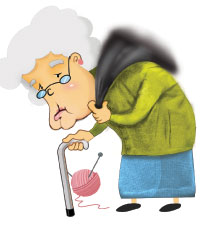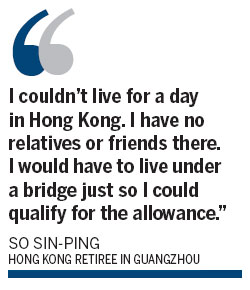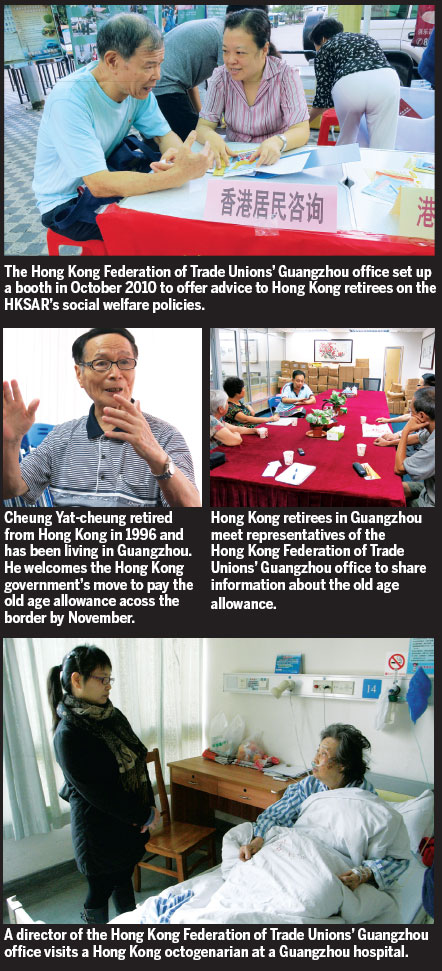Old folks in a dilemma
Updated: 2013-06-28 07:40
By Li Yao(HK Edition)
|
|||||||

The trend of Hong Kong seniors spending retirement life in Guangdong, which surged after the handover, is reversing as a falling dollar and rising costs on the mainland are making their lives there increasingly tough. Li Yao reports.
So Sin-ping, 78, turns bitter. Tears welled in her eyes as she recalls the day the Hong Kong government rejected her application for the old age allowance.
Many Hong Kong retirees who live in Guangzhou are in the same position as So. Recipients over 65 are required to live in Hong Kong at least 60 days a year. If not, they're not eligible for the benefit. That's a real sore point for people who say they can't afford to live in Hong Kong because of the high cost of living.
So's spirits lifted a little when the news came that the restriction was going to be lifted. In November, elderly Hong Kong residents who live in Guangdong no longer will be disqualified. So will get HK$1,135 a month - the same as retirees who live in Hong Kong.
It's been a long, hard road for So and it's left its scars. Back in 1980, she retired from her job at a tractor factory in Hunan. She came to Hong Kong to look after her mother. She took a job as a housekeeper.
The years passed. Her employer emigrated to Canada. Her mother died in 1996. So's husband, who was living in Guangzhou, got sick. There was nothing to keep So in Hong Kong any longer.
"I couldn't live for a day in Hong Kong. I have no relatives or friends there. I would have to live under a bridge just so I could qualify for the allowance," she exclaimed.

She lives with her son's family now that her husband is gone. He died in 2008. So began having serious chest pains herself. The doctor diagnosed angina pectoris. She gets injections three times a week for the heart condition - that costs her money over and above the medication she's been taking for 25 years to control her high blood pressure. So is afraid of having to make additional hospital visits. She doesn't have enough money. Hong Kong residents pay full rate and those rates can be high.
Even now, where she is, So keeps to a tight budget - sometimes foregoing medications prescribed by her doctors. She gets a pension of 1,384 yuan (HK$1,747) a month, paid by the mainland tractor factory where she had worked. She pays 600 yuan to her daughter-in-law to cover rent and food. Another 300 yuan goes to her medical bills.
Every penny counts. It will be a welcome relief when Hong Kong starts paying the old age allowance across the border. Under the new, liberalized rules, applicants are required to reside at least 60 days in Guangdong to get the full allowance. But even though the Hong Kong residency requirement was lifted, her greatest concern: access to affordable health care, goes unresolved.
One step forward
Cheung Yat-cheung, 81, shares So's anxieties about the allowance. Cheung moved to Hong Kong to join his parents in 1983. He worked at private companies in Hong Kong until he retired in 1996. He gets no pension. He and his wife live with their son in Guangzhou.
Cheung acknowledged the Hong Kong government has taken a positive step to extend the old age allowance to applicants living in Guangdong. The plan was introduced by Chief Executive Donald Tsang Yam-kuen during the final policy address of his tenure in October 2011. Policy-makers and political councilors have voiced concerns about difficulties implementing the program. It'll be a real challenge applying the government's means test and tracking assets when an applicant lives outside Hong Kong jurisdiction. One of the big fears was that disqualified applicants still would be able to find a way to collect the monthly payment.
Sometime next month, Hong Kong will open a new office in Sheung Shui, near Shenzhen, to handle the applications of cross border residents. The new regulations take effect in November. Some 30,000 eligible retirees are expected to join the program during the first year, with the annual expenditure expected around HK$395 million, according to Secretary for Labour and Welfare Matthew Cheung Kin-chung's remark to media on June 10.
The Labour and Welfare Department has appointed the International Social Service Hong Kong Branch to carry out the plan under a three-year contract. The organization has offices in Shenzhen and Guangzhou. It will help elderly citizens living with handicaps or serious illnesses to handle the applications, so they don't face the struggle of having to travel back to Hong Kong.
Still, Cheung Yat-cheung, the octogenarian, describes himself as "at a loss" concerning healthcare coverage. He shares So's opinion and sees himself excluded by the medical systems both in Hong Kong and Guangdong. Cheung has coronary heart disease and high blood pressure. It's not rare that patients at mainland hospitals, including local residents, are charged up to 100,000 yuan for critical illnesses, he said.
The old age allowance is popularly called "fruit money", because it is not designed to function as a pension plan. It's a small amount that gives elderly folk some extra cash - say, enough to buy fruit. But it's not sufficient to provide a decent living.
Cheung reasoned that people like him did the Hong Kong government a favor by moving across the border and helping to ease pressure on public spending in Hong Kong. He cites costs for running elder care homes, hiring care givers, providing transport concessions as only some of the burdens on the public purse for the care of local retirees.
Too little to really matter?

Many Hong Kong elderly who chose to reside in Guangdong are among the poorest in the society. They desperately need whatever assistance they can get, said Wong Miaoming, 62. She has lived in Guangzhou, taking care of her brother, 71-year-old Wong Hon-sheung, for the past 11 years.
Wong Hon-sheung made a small fortune in Hong Kong, selling home appliances. He lost it during the 1997 Asian financial crisis, went bankrupt - his wife divorced him. He tried to settle in Guangzhou, but then in a succession of mishaps of ill fortune, was knocked down by a stroke and left semi-paralyzed, then he suffered a leg injury that made him dependent on an electric wheel chair to get around.
The wheelchair-bound invalid missed out on eligibility for the old age allowance over the past decade. His sister seeks out whatever information she can get, and tries to find organization or projects that may offer financial assistance to her brother. In 2012, he got a grant of 1,000 yuan from the New Home Association, a group that helps cross-border families.
The grant has benefited 40 people since last July, with funding from the Ministry of Civil Affairs and the association itself, said Peng Xuanxun, a social worker at the association's Guangzhou office during a telephone Q and A.
The association will review the project, consider whether to allocate more funds for the group, and publish a book detailing the struggles of these Hong Kong elderly people in Guangdong, Peng said.
Peng held up reservations about how much real help Hong Kong's old age allowance can offer. She said giving what previously had been denied Hong Kong retirees in Guangdong will be more of a comfort to soothe hurt feelings than to provide a substantive sum to improve living conditions.
The association is pressing for liberalized policies from the Hong Kong government to help this segment of the population in serious need. Among the measures, the association wants Hong Kong to negotiate with mainland authorities and arrange for Hong Kong retirees to have access to social welfare facilities when they reside in mainland cities.
Contact the writer at liyao@chinadaily.com.cn

(HK Edition 06/28/2013 page6)